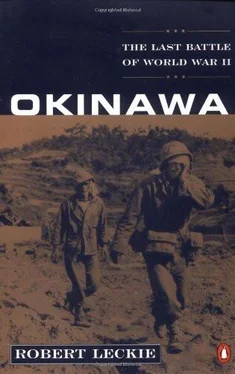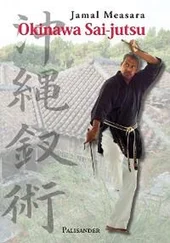Up front the attacking Americans were slowly letting out their breath. A soldier of the Seventh Division standing on a hill south of the Bishi River spoke for all of them when he said: “I’ve already lived longer than I thought I would.” On his left the Marines were also submitting to the Great Loo Choo’s pastoral charm, one of them feeding a box of K rations to a goat, which quickly gulped it down—cardboard and all—while others rounded up the shaggy little Okinawan ponies and vaulted aboard with shouts of glee.
“Ya-hoo!” one of them yelled. “I’m Captain Jinks of the Horse Marines!”
Out among the forest of masts in the Hagushi Anchorage Colonel Cecil Nist, General Hodge’s intelligence officer, could hardly believe the radio reports from the beaches. The troops had found what the aerial photographs suggested: formidable but empty enemy positions, and now the suspicion that had replaced apprehension was gone, to be supplanted by relief. Major General Shepherd moved his Sixth Marine Division headquarters ashore with the remark: “There was a lot of glory on Iwo, but I’ll take it this way.”
Shepherd and his staff sailed past the new LST-hospitals riding lonely and unattended at anchor, with not even a single enemy aircraft threatening to plant the customary bomb in the center of that big red cross. On one of them assigned to the First Marine Division, the ship’s surgeon was impatient. From the moment the amtracks rolled into the sea, his medical corpsmen had been at work transforming a ship-of-war into one of mercy. Litter left behind by the Marines was heaved over the side, the tank deck was hosed down and rows of cots set up inside it. Up forward the bow doors remained open and outside them a company of Seabees rigged a pontoon-pier for casualty boats. All was accomplished within two hours, and the ship’s surgeon—a small, thorough, fussy man, obviously a perfectionist—strode out onto the pier, satisfied. He stood there, watching the columns of attacking Marines vanishing behind the seawall. But there was no bloody return traffic. Puzzled, he turned anxiously to a corpsman.
“No boats, no wounded?”
“Nothing yet, sir.”
The surgeon shrugged, almost ruefully, and went back inside his LST. In a moment he had hastened outside again, having heard the sound of a boat’s engine. A Marine was clambering out of it onto the pier.
“What’s wrong with you, son?”
The Marine held up a hand spouting blood from one of his fingers.
“One of my buddies let one go and shot the top of my finger off.”
The surgeon peered at it, turning to a corpsman to order it dressed.
“What’s happening in there, son?”
“Don’t ask me, Doc. All I know is everybody’s goin’ in standin’ up.”
The surgeon sighed. He glanced shoreward again, turning to go inside for lunch. Coming back to the pier, he still saw no return traffic. Calling to his solitary patient, he said: “C’mon, son, let’s go make you a new finger. We’ve got plenty of time to do it in.” [6] This incident, reported by George McMillan in The Old Breed, his history of the First Marine Division in World War II, does not ring true. Marines are trained to keep their weapons on safety lock even during an invasion, and not to unlock them until a firefight is about to erupt or until receipt of enemy fire. “Let one go” is also untypical. “Got his gun off” is the proper slang. I can remember a corporal I learned to despise from Guadalcanal onward running toward the beach at Peleliu with terror on his face and holding his right hand aloft with the trigger finger missing and spouting carmine. My only comfort watching him sprint for the safety of the Battalion Aid Station on the beach was that his missing member would always remind him of his cowardice. So I doubt this episode—from the pen of a headquarters sergeant—and mention it only to show how absolutely unopposed the Okinawa invasion actually was at its beginning.
That was Love Day on Okinawa, a most fortuitous eight hours of daylight during which the Tenth Army captured two airfields and a beachhead eight miles wide and three to four miles deep—all at a cost of 28 killed, 27 missing, and 104 wounded. Many of these were among the ranks of the Second Marine Division, supposedly having drawn the “soft” assignment of feinting at the Minatoga Beaches. Down there another suicider put three holes in destroyer Hinsdale, and the stricken ship had to be towed to Kerama by tugs, the first invasion ship to achieve that dubious distinction. The next day when the Second’s Marines made another demonstration, returning to their ships as planned, General Ushijima fired off an exultant report to Imperial General Headquarters claiming to have forced the enemy to withdraw “after being mowed down one after another.”
Rather a different situation actually existed on Okinawa, where some fifty thousand Americans had come ashore almost unimpeded within a single day. Objectives expected to require three or more days and take many lives were firmly in American hands by nightfall. At Yontan Airfield there were bulldozers clearing away wrecked enemy planes and General Ushijima’s clever dummies of sticks, stones, and cloth. Already there was an airplane approaching a runway. But it had a big red ball on its fuselage. Its roar as it circled became louder as bulldozers fell silent and Marines hopped to the ground clutching rifles. Others heating their rations with gunpowder fires stood erect and seized theirs, walking quietly toward the landing strip. The Zero swung seaward for a smooth landing.
The pilot wriggled out of his parachute pack. He climbed down to the tarmac. He walked toward the waiting Marines. He stopped. Between that moment in which he reached for his pistol, and the next when he slumped to the runway, riddled, an expression of indescribable horror had passed over his face.
“There’s always someone,” a Marine said ruefully—“there’s always one poor bastard who doesn’t get the word.”
The Marines Overrun the North
CHAPTER NINE
On the morning of April 2 American fighting men awoke in amazement to see vapor puffs issuing from their lips, their feet so chilled that they began to stamp them vigorously. The temperature was somewhere around fifty degrees and would not go above sixty, and most of these men with their blood thinned by years in the tropics felt as though they had arisen on the Arctic Circle. Actually, they welcomed a respite from the tropic heat with all its poisonous reptiles and vegetation and diseases, and they were again surprised to draw new issues of wool and gabardine field jackets to warm them—a tribute to the service of supply if there ever was one.
They moved out rapidly along the narrow roads—the GIs heading south, the Marines marching east and north—passing through peaceful fields plotted and pieced around little thatched farm cabins, each sheltered behind stone walls or bamboo wind-breaks. Leathernecks of the Sixth Division—who now proudly called themselves “the Striking Sixth”—quickly gathered momentum in their approach march to Colonel Udo’s three thousand holding the mountain fastness. Their first objective was Zampa Cape to give Admiral Turner the site for a badly needed radar station to warn of approaching Japanese aircraft, while the First struck east across-island for Nakagusuku Bay, believed to be an excellent anchorage and soon to be called Buckner Bay.
“Off and on!” the sergeants shouted as the men finished their morning rations. “Get a move on, you mother’s mistakes—an’ keep both ends up!”
“You there, Drag-Ass, whattaya lookin’ behind you for?”
“I can’t help it, Sarge—I keep feelin’ somebody’s gonna cold-conk me from behind.”
Читать дальше










